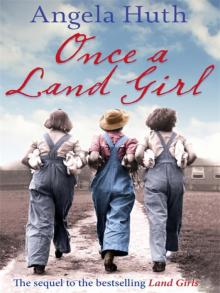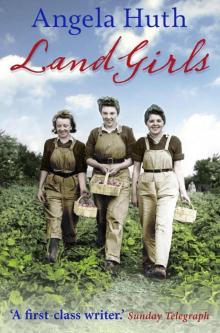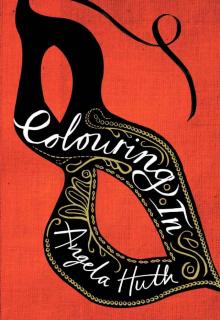- Home
- Angela Huth
Land Girls Page 10
Land Girls Read online
Page 10
The Lawrence family exchanged glances. Joe tried to suppress a smile.
‘It’s not one of the pleasantest jobs, and it doesn’t have to happen that often, but everyone should know how to do it,’ explained the farmer. ‘You have to keep a check on the sheep’s feet, pare the hoof if necessary. Don’t worry: I’m an experienced instructor. Got young Joe down to the job at twelve or thirteen, didn’t I, son?’
‘And what’s the other thing?’ asked Prue.
‘Dagging,’ said Joe. ‘I was doing that not long out of my cradle, wasn’t I, Mother? Dad found me some special small shears.’
Joe, Stella could see, was beginning to enjoy himself.
‘I think,’ said Mrs Lawrence, handing round plates of steamed ginger pudding, ‘you could explain that, John, when the time comes. I don’t want people put off their food.’
There was a moment’s silence, then Joe cast his eyes towards Prue. She met his glance at once.
‘I can see you’re dying to know,’ he said. ‘So here goes. Dagging, in a word, is cutting the dried shit off a sheep’s backside.’
The shocked silence was quickly broken by the laying down of astonished spoons. Ag laughed, but was at once cut off by a whiplash look from Mrs Lawrence.
‘Joe!’
‘Sorry, Mother.’
Prue was smothering a giggle in her hands. ‘Well, I tell you what, Joe, Mr Lawrence,’ she said. ‘Count me out. A girl has to draw a line somewhere, and if you think I’m going to cut shit off a sheep’s bum you can think again. I’d rather …’ she tried to think of some slightly less horrendous task – ‘I’d rather clean out the pig.’
‘You do what you’re told, my girl,’ snapped Mr Lawrence, his good humour suddenly gone. ‘If you’re so keen on cleaning out the pig, you can take that job over from Faith once you’ve finished the dagging.’
The girls had never known him so stern and darkly flushed. He picked up his spoon and plunged it into his pudding again. The others, all but Prue, followed his example. She looked down at her uneaten sponge, suddenly pale, and gasped.
‘Oh my God! I’ve forgotten something.’ She stood, addressed Joe. ‘I’ve forgotten to put the sacking over the tractor engine.’
‘Did you remember to drain the radiator?’
‘’Course I remembered to drain the radiator.’
‘Then it’s not that serious,’ Joe said.
‘Sit down, it can wait till we’ve finished eating.’ Mr Lawrence’s anger still simmered.
‘I’ll give you a hand.’ Joe was less brusque than his father.
‘I don’t want a hand, thanks.’
Prue left the room at a run.
‘Stupid girl,’ said Mr Lawrence, and shouted through the door that there was a torch on the dresser.
The night was cool and hazy. A diluted moon cast greenish light over sauntering clouds, too feeble to light the farmyard. Prue hurried across to the barn, the beam of the torch paddling like a single oar over the muddy ground and piles of dung.
Even in the darkness the security of the barn touched her: the smells of hay, chaff, sacking; the scurrying of mice in the straw, the purring of sleepy pigeons in the rafters. The tractor, in silhouette, was an enormous queenly hunk in this softly shining kingdom, old mudguards spread like proud but ailing skirts. Prue put a hand on the engine. The metal was icy cold, but not frozen. She found two or three sacks and covered it. She’d remembered everything else: how could she have forgotten this last, essential act?
Prue switched off her torch, moved towards a dim bank of stacked straw. She climbed until she was higher than the tractor, could look down on it and the farmyard beyond. In her hurry she had forgotten her coat. Although she had changed out of her working shirt and jersey for supper, she had kept on her breeches, thick socks and shoes. So only her arms were cold. But she didn’t want to go back. Not just yet.
She clutched her arms under her breasts, rested her head on her corduroy knees. The feeling that prevailed was anger – anger with herself. The last thing she had wanted to do was make Mr Lawrence angry: her reaction to the dagging had been half in jest – surely he could have seen that? Of course she would have cleaned the blinking sheep’s bum without a murmur when the time came – but a girl is entitled to make a protest, even if there is a war on. She wanted very hard to prove herself, guessing what farmers must think of hairdressers. But it wasn’t easy. She’d spent ten hours ploughing that field, no stop for lunch or tea, furrows straight as a die – and what praise did she get? None. Not a word. Great reluctance on the part of the Lawrences even to come and look at her handiwork. Mr Lawrence had just stood by the gate, muttered ‘Looks all right to me,’ and had moved away when his wife had nodded, supposedly in agreement. They were cross with her, of course. Cross about Joe. And Janet. But if it hadn’t been for Stella and Ag, almost too extravagant in their praise and amazement, Prue would have burst into tears. Just the tiniest bit of appreciation from the Lawrences was all she had wanted: the understanding of what it took for a girl used to doing permanent waves, in a warm and cosy salon full of chattering customers, suddenly to spend a whole day carving up acres of bitter earth, alone. At the thought of the salon, Prue began to cry.
She realized, in this first moment really to think since she had arrived, that she was homesick. She missed her mum: that funny, warm, bleached-haired, spoiling lady, buoyed by eternal optimism and nightly gin, never quite sunk by disillusion. She missed the local gossip, the northern jokes, the laughter, the intricate schemes for making do – her mum was a genius in that respect. Just before leaving home, Prue had been asked to a charity tea-dance in aid of the Home Guard: in a trice Mum had run up a beautiful dress made from left-over blackout stuff. She had stuck it with sequins and Christmas tree tinsel, swore it would look almost like ostrich feathers under the electric light. The next morning, when Prue presented the blackout dress ripped of its decorations (an impatient pair of RAF hands had quickly seen to that) – well, they’d had a laugh.
They had agreed, Prue and her mother, not to say in their stilted, badly spelled letters how much they missed each other: it would be too painful. But they both knew. God, how Prue longed to hear her voice, to be back in the smallness of things at home: the salon, the small terraced house, the back row of the picture palace just down the road. Here, there were such houseless miles, such silence – except for the tractor, whose grunting Prue found a comfort. And indoors, for all Mrs Lawrence’s hard work, there were no … what Prue would call nice touches: no aspidistra in a copper bowl, no crochet antimacassars, no wooden clock carved to look like a setting sun, no Victorian tins with their Christmas pictures of ruddy children with toboggans and holly, or coaches and horses. For some reason, Prue missed the sterile little kitchen with her mother’s collection of biscuit tins more than anything.
She raised her hand, sniffing, to be dazzled by the beam of a powerful torch. It quickly moved to one side. Prue could make out the figure of Joe standing by the tractor.
‘So there you are,’ he said. ‘Tractor covered, I see. Coming down?’
‘Soon.’
Joe banged one of his jacket pockets. ‘I’ve got a Mars bar.’
Prue giggled. Her tears dried. Biscuit tins fled.
‘Where did you find that? There aren’t any in the village.’
‘I have my sources. I’m stocking up against sweet rationing. Come on down and I’ll give you a bit.’
‘You come up here. Why not? It’s warmer.’
‘If you insist.’
In a few huge, climbing steps, Joe was beside her. It was almost completely dark: she could only just make out the blunt edges of his profile. There was a strong smell of animal on his boots. Vaguely, she could see him take the Mars from his pocket, strip off its paper wrapping which crackled thinly as finest taffeta, and hold it out to her. She felt almost faint with desire for a taste of the chocolate.
‘Got a knife?’ she asked.
‘No. Can’t you just bite a bit
off?’
He pushed it at her. Duskily, their hands met. She took it from him. Unable to see how far she was biting, she aimed for a modest length. The sweetness of the toffee, malt and chocolate was more delicious than any taste of Mars she had ever known.
‘Thanks,’ she said, smudgily, mouth full. ‘That’s absolute heaven on earth, that is. That’ll have me working, resting, playing, dagging, like nothing you’ve ever seen.’
For the third time, Joe laughed, firing Prue’s confidence. Somewhere in the dark she recognized the outline of her chance.
‘Aren’t you cold?’ he asked, after a while.
‘Not really.’ Prue shivered, not entirely from the cold. ‘Where do you go most evenings? We’ve all been trying to guess.’
There was a long pause before Joe answered.
‘Walk up to The Bells, have a couple of pints with my friend Robert. We talk. Nothing very exciting.’
‘That all? I imagined something very different.’
‘I bet you did. Robert owns a farm nearby. Like me, he can’t be called up for medical reasons. Like me, he’s stuck on the farm all day, no one to talk to.’
‘There’s us, now,’ said Prue, after a while.
‘I suppose there is. But I’m not used to that idea, yet.’
‘You’re not easy to talk to, actually, are you? Pretty surly, on the whole.’ Prue turned on him with a sweet smile, hoping his eyes had grown accustomed to the darkness and it would not be wasted.
‘Surly? Me? Strange idea. Reflective, more, I would have said. More Mars?’
Again their hands briefly touched as she took the half bar, bit off another modest share.
‘Thanks. Well, you’re not at all surly tonight. First time.’
‘I expect you find it all a bit strange, don’t you? There’s so much to do, I dare say we’re all rather preoccupied. It must be very different from your normal life.’
‘It is, of course. But I rather like it.’
‘It’s tough work.’
‘I don’t mind that.’
‘Some pretty disagreeable. Wait till it’s your turn to do the pig.’
Prue was colder, now. She clutched her arms more tightly about her.
‘What I wanted, you know, was to be in a circus. That was my childhood dream. I used to practise little bits of acrobatic stuff from about five onwards. I used to put a plank between two chairs and call it my tightrope. I could do a backwards somersault from standing, when I was eight. I’d go to every circus I could – not many, mind – and long to be one of those acrobats in sequins. But my dad put his foot down, said no daughter of his was going into a circus. I went on practising whenever I had a chance, but then the enthusiasm sort of went.’
She sensed Joe turning towards her, interested.
‘I walked a plank about twelve feet high, once. Never a real tightrope.’
‘Could you have gone higher?’
‘Easy. Just never had the chance.’ She gave a small sigh.
‘Here’s your chance, then.’ Joe stirred. He switched on his torch, lighting a crossbeam high above their heads. ‘Bet you couldn’t walk that.’
Prue studied the huge beam of blackened wood. It was wide enough, but many times the height of anything she had ever tried before. Disturbed by the torchlight, pigeons in the rafters broke into murmurous complaints.
‘Ooh, Joe. How’d I get up?’
‘There’s a ladder. If you fell you wouldn’t come to much harm – all this hay and straw. Besides, I’d catch you …’ He swung the beam of the torch so that half Prue’s face was lighted. ‘Don’t do it if you don’t want to. I just thought it might be a lark.’
Prue looked into the deep, complicated shadows of his face.
‘What would you think if I said yes, if I had a go?’ she asked.
‘Well, I don’t know. I suppose I’d think you were rather brave.’
‘Switch off the torch, then.’
‘Why? I’ll have to light your way very carefully.’
‘Just for the moment. I want to take my shoes and socks off. I don’t want you watching that.’
Joe turned off the torch. The darkness, renewed, seemed deeper. While Prue fumbled with her laces and pulled off her woollen socks, she heard Joe finish the Mars.
‘Right?’
‘I’m ready.’
‘I’ll help you down, put up the ladder. Sure you want to do this?’
‘’Course.’ Prue’s voice was light.
Joe jumped down to the ground, put out a steadying hand to help Prue scramble after him. They landed close together by the tractor. Prue touched its mudguard, steadying herself. Her heart was battering. She was no longer cold.
‘Pity there’s no fanfare of trumpets,’ Joe said. ‘Really, you need trumpets.’
Prue cocked her head, again hoping the wan light of the moon would be just strong enough to illuminate her devil-may-care expression.
‘That’s the nicest thing you’ve ever said to me,’ she said. ‘You need trumpets. I shall always remember that: you need trumpets.’ She was surprised by the shakiness of her voice.
‘Come on, silly.’ Joe touched her shoulder. ‘I’ll get the ladder.’
Here on the floor of the barn she was better able to see the large dark figure of Joe as he collected the ladder and propped it up against one end of the beam. Then he lit his torch again, flashed it up the rungs.
‘All right?’
‘Fine.’
Prue moved to join him, straw and rubble of the floor troubling the soles of her feet. She trembled with excitement, with fear.
‘Don’t worry about the ladder. I’ll hold it firm. Then I’ll keep the beam of the torch just ahead of you.’
‘Okay.’
Prue took hold of the ladder’s sides, put a foot on the first rung.
‘Imagine the trumpets,’ said Joe quietly.
Prue began to climb.
For the first time since she had been at Hallows Farm, Ag felt restless. Neither the news nor her book could fully engage her attention. In the sitting-room, where Mrs Lawrence made progress with a pair of socks for the troops, and Mr Lawrence sat with head tipped back, eyes shut, Ag studied the mauve-blue of the flames as they hissed up through a pile of damp logs. It was too early to go up to the bedroom. Besides, she did not want to disturb Stella in her letter-writing. Ag believed in protecting people’s need to be alone: she was always at pains not to intrude. She could not be sure of what she wanted to do, where she wanted to go. Some vague anxiety about Prue assailed her, and then a larger worry seared: she had shut up the chickens, but not the bantams. Dear God, how could she have forgotten? Just like Prue, she had failed over a vital matter. Dreadful pictures flashed into her mind: the corpses of fox-chewed bantams littering the yard in the morning: Mr Lawrence’s anger, Mrs Lawrence’s sadness, disappointment … they would be unbearable. She would never forgive herself, such stupidity … Never disappoint had been her father’s unofficial motto, branded deep into her since childhood. Here she was, just one week into her job, about to disappoint deeply.
Ag put down her book and swiftly left the room, whispering goodnight to Mrs Lawrence.
Outside, she found the denseness of the night confusing. No stars were visible. The moon, elusive in wandering clouds, would give ghostly light for a moment, then disappear again, leaving total blackness. Ag had a torch in her pocket, but determined not to use it till she reached the bantam house. You had to be so careful about light after dark, Mr Lawrence had warned them. She made her way cautiously through the garden. Unseen branches brushed at her face and snagged her arms. Despite the firmness of the ground, there was a sense of drowning. The sudden hoot of an owl made her heart race: she dreaded what would surely be a long hunt under hedges for the bantams.
Far sooner than she expected a familiar smell of creosoted wood came to her out of the darkness and she ran to the henhouse. She switched on her torch, slid the door of the peephole to one side. Inside were all ten roosting hens,
heads drawn down into raised neck feathers, giving them a look of unconscious indignation. A couple of them, disturbed by the torchlight, began a minor, sleepy clucking. Ten pairs of wrinkled eyelids quivered, but none of them quite opened.
Ag moved away to the bantam house. She switched off her torch at the sudden return of the moon. In its brief light the wire netting, nailed to the wooden frame of the run, looked fragile as cobwebs. There were no birds in the run. The door was ajar, just as she had left it when she had let them out this morning. Ag closed it, shone her torch through the peephole of the house. To her amazement, there were birds inside, huddled more closely than the chickens, their feathers a grainy sheen. Five of them had returned to the fold on their own: just one was missing.
Ag’s feelings of relief at the safety of the five were clouded with anxiety about the missing one. She hurried back through the garden, torch beam discreetly sweeping the ground, but with little hope of finding the bird here. The barn, she thought, would be the most obvious place. The bantams always congregated in the barn by day. It often took a while to flush them all from their hiding places when it was time to shut them up at night.
According to the restless rhythms of tonight’s sky, it was the turn of darkness again when Ag reached the farmyard. She made swiftly for the barn. From halfway across the yard she saw a slash of torchlight inside. She stopped, straining to hear muted voices. Have you seen a bantam in there? she wanted to shout: but then her concern for the bantam was overwhelmed by curiosity, fear, dread. What was happening? She slowed her steps.
By the time she gained the barn’s entrance, Ag could hear exchanged words clearly.
‘Sure you’re all right?’
Long pause. ‘I’m fine. It’s fun up here.’
It was Prue, for heaven’s sake, with Joe.
‘You’re doing well. Not much further.’
Ag flattened herself against the outside wall of the barn, peered round. She saw Joe, back to her, looking up, torch trained to somewhere high above him. As her eyes grew accustomed to the dim scene she could see shadows huge as sails flapping at the walls of the barn, their shapes cut into by the expanding beam of torchlight that showed Prue – dear God, the fool, the fool – engaged on some flight of madness in the rafters …

 Sun Child
Sun Child South of the Lights
South of the Lights Virginia Fly is Drowning
Virginia Fly is Drowning Of Love and Slaughter
Of Love and Slaughter Such Visitors
Such Visitors Once a Land Girl
Once a Land Girl Land Girls
Land Girls Colouring In
Colouring In Nowhere Girl
Nowhere Girl Monday Lunch in Fairyland and Other Stories
Monday Lunch in Fairyland and Other Stories Another Kind of Cinderella and Other Stories
Another Kind of Cinderella and Other Stories Invitation to the Married Life
Invitation to the Married Life Easy Silence
Easy Silence